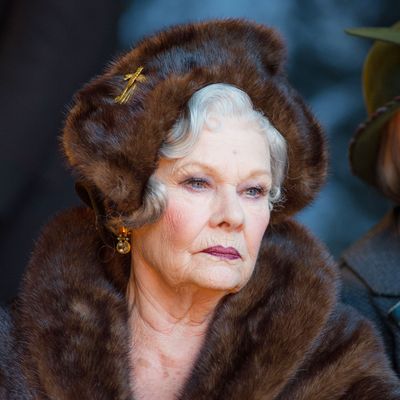
No, we didn’t. I assume that’s your first question: “Did we need another Murder on the Orient Express?” We already had a fairly inert specimen from 1974 directed by Sidney Lumet, made memorable by a spectacular assemblage of stars (Albert Finney, Ingrid Bergman, Vanessa Redgrave, Sean Connery, Maggie Smith, Anthony Perkins, Lauren Bacall, John Gielgud…) and an okay TV version with David Suchet’s near-definitive Hercule Poirot and the young Jessica Chastain. Kenneth Branagh’s latest has a less memorable but still impressive group of actors and changes the dramatic emphasis, turning Agatha Christie’s famed Belgian detective (played by Branagh) into a poignant lost soul instead of an unvarying collection of tics and pet phrases. But it’s basically the same slog.
The pacing is built into the material. I admit to having read all of Christie’s books — every one, God help me, at an early developmental stage — and the only reason that Murder on the Orient Express loomed large was its unique solution. Otherwise, it’s not much of a mystery story. Poirot finds himself on a train with the corpse of a sleazy businessman (who’d been receiving threats) along with people from an unusually large number of classes and cultures. All of them look guilty and all of them look like red herrings. A second viewing (after you know the outcome) would yield no new insights. Which means the best person to ask about the effectiveness of Branagh’s adaptation would be someone who went in cold. I’ll try to be second best.
To forestall our sad realization that we’ll be stuck for a couple of hours on a train (and part of that a stationary, snowbound train), Branagh opens the film with an irrelevant mystery astride the Wailing Wall that does yield one good bit of business: Poirot steps squarely into a pile of manure, and rather than wash it off he plants his other foot in the same pile to restore the balance. He later explains that he’s a man who cannot help but home in on the unbalanced, the disorderly, the illogical, the piece that doesn’t fit. And in this version it’s portrayed as a curse rather than a blessing. This reflexive aversion to disorder, Branagh’s Poirot suggests, has kept him away from the society of men — and women. His “little gray cells” are his only company. He’s the most forlorn of Hercules.
As the shady businessman, Ratchett, Johnny Depp sports scars and uses a thuggish accent. He comes off like a broad, summer-stock actor — but I like summer stock and like, in small doses, his funny voices and wardrobe choices. He and Branagh have one of the tightest scenes, in which Ratchett asks Poirot to work for him and Poirot, not given to niceties, says he doesn’t like Ratchett’s face. Depp’s Ratchett takes that in stride. His face isn’t his fortune.
For the rest, there’s not enough of Penélope Cruz (though what’s there isn’t much fun) as a religious neurotic or Olivia Colman as the aide of an unusually subdued Judi Dench. But Daisy Ridley is a pleasingly stylized ingénue, Leslie Odom Jr. in fine high dudgeon as a self-important doctor, Josh Gad a fount of fish eyes and twitches as Ratchett’s whisky-swilling secretary, and Tom Bateman breezily attractive as the wealthy railroad executive turned impromptu Dr. Watson (or, this being Poirot, Captain Hastings). Willem Dafoe’s silly accent as a racist Austrian professor made me laugh out loud (with him, not at him), and Michelle Pfeiffer is a hoot and a half as a flamboyantly theatrical man-hunter, stealing every scene.
Say this for Branagh: He works like mad to jazz things up without being vulgar. The film is full of arresting vistas — arresting in part because you’re constantly wondering what’s real (probably little) and what’s CGI (probably lots). The camera zigs and zags and hurtles after Poirot and other characters as they move through the Istanbul station (the film is set in the mid-1930s) and onto the platform of the legendary Express. When the dead body is discovered, Branagh cuts to an overhead shot of the businessman’s compartment. Why? Makes for a change. For the final unmasking of the killer, Poirot doesn’t use the handy dining car. He sits the suspects in a straight line at the end of a railroad tunnel with torches on either side. It’s Survival: Agatha Christie. Alas, Branagh puts nothing into evoking a mood of fear or paranoia. For him, the story centers on the personal growth of his character: Will Poirot’s aversion to disorder finally yield in the name of humanity?
To return to why Murder on the Orient Express was remade: Beats me. Maybe it’s someone’s idea of counterprogramming when every other film in the multiplex is for kids or yahoos. Maybe it’s a tax shelter. I enjoyed parts of the movie, savoring the actors though aware that half of my own little gray cells were snoozing. A higher percentage might be engaged if you’re a newcomer to Christie’s world, in which case bring your knitting and a flask of Earl Grey and brace yourself for a mild ride.


